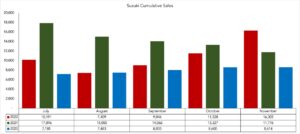LAHORE: Suzuki has notified the Pakistan Stock Exchange that it will halt all production from January 2 to January 6. This will be the sixth time that Suzuki will observe non-production days this fiscal year. However, this will be the first time that Suzuki will halt production for both its automotive and motorcycle plants.
Suzuki has cited insufficient inventory levels due to the State Bank’s restrictions on imports of completely knocked-down (CKD) kits as the main reason for its actions. The company had previously halted production from August 18 to August 19, August 22 to August 26, August 29 to August 31, October 19 to October 21, and October 24 to October 26.
“Suzuki will have cumulatively observed twenty-one non-production days for its automotive plant and five days for its motorcycle plant. It is a very critical time for Pak Suzuki due to import restrictions and also no future information till how much more time these restrictions will continue. Detention, demurrages, and KIBOR+3% are really hurting our industry,” says Shafiq Ahmed Shaikh, Head of Public Relations and Official Spokesperson at Pak Suzuki Motor Company Limited.
“Our dealerships and vendors are also very disturbed due to no sales and production respectively. Request to the Government of Pakistan to please have discussion with Industry to solve the matter on an urgent basis,” Shaikh continued.
The spectre of the State Bank over the automotive industry
Suzuki’s announcement comes exactly a week after Toyota Indus Motor had made public that they will be halting their production for the remainder of the year on account of the same reason. Similarly, Honda has also observed 15 non-production days this fiscal year due to the State Bank’s import restrictions.
Their blame, however, is not misplaced. In May, the State Bank issued a circular stating that it now possessed administrative oversight over the import of CKD units of cars being imported into the country.
The State Bank’s announcement regarding CKD imports came only a day after the government imposed an import ban on luxury items in an attempt to stem foreign exchange outflows. While cars were not a part of the ‘luxury’ items banned by the government, they did come under scrutiny from the State Bank in a much subtler manner.
Essentially, the State Bank told car companies in Pakistan that they needed to seek permission before performing transactions in dollars for the import of CKD kits. This meant that auto assemblers in the country will now need express permission from the State Bank to assemble them in the country.
Through this permission, the State Bank was now able to control how many cars were being imported and how many dollars were outflowing. This became the cudgel that the State Bank now uses against the automotive industry in an attempt to provide life support to Pakistan’s dwindling current account position.
Link between the State Bank’s measures and Suzuki’s worst start in two years
The ramifications of the State Bank’s decisions has been that Suzuki has had the worst start to a fiscal year since FY 2020-21. Suzuki, like the majority of Pakistan’s automotive industry, operates on a just-in-time model. Per the model, Suzuki only begins manufacturing vehicles after having taken orders for the vehicle. A consequence of this model is that it has relatively high lead times. An inability to freely access letters of credit needed to import the CKD kits to manufacture the cars pushes up lead times even more so.
This, consequently, leads to Suzuki being able to take lower orders all in-advance due to its inability to handle similar levels of volume it saw in previous years. Five month cumulative sales volume for Suzuki’s cars and motorcycles is 24% lower year-on-year compared to the same period in FY 2021-22. However, as with non-production days, Suzuki is not the only one suffering from demand destruction in the current climate. The notification comes the two weeks following Millat Tractors’ decision to permanently observe a four-day work week due to insufficient demand.






Is pakistan run by 40 IQ monkeys? Cousin marriage taking it’s toll.
Very useful information keep it up!
When plant will b open?